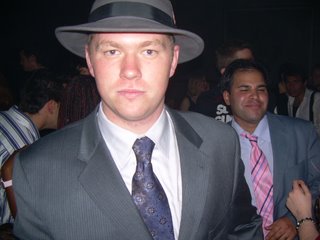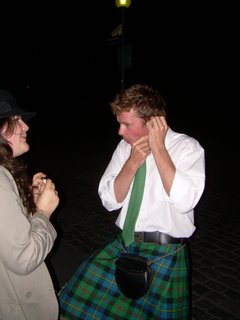(Author’s note: I will try to be very clear in what follows in drawing distinctions between what I think, based on evidence and theory and observation, and what I believe, which is based on nothing at all.)
As I have lately been remarking to absolutely everyone, regardless of whether they will listen or not, I have grown sufficiently bored that I have decided to direct my energies towards attempting to write articles which I will then fail to have published in Marxist theory journals. Unfortunately, I find the failings of Marxism and the contemporary left in general to be so staggering that I have no idea where to begin. This of course led to the excellent question of why I still cling to Marx.
After all, you heard Fukuyama--isn’t Marxism dead? Hasn’t the failure or extreme compromise of every self-described socialist country proven that Marx’s ideas, however well-intentioned, are not practical or desirable in the real world? Doesn’t the inability to empirically verify the labor theory of value bring the entire theoretical edifice of Marxism crashing down anyway? Can Marxism be taken seriously, what with its political economy moribund at best, its proponents scattered, leaderless, and prone to bitter infighting, and its increasing irrelevance in electoral politics?
Well, what can I say. I like a challenge.
My affinity for Marx can be generally split into two categories: the intellectual and the personal. I will begin with the latter first, as is my habit.
Like virtually every other Marxist ever, I was initially driven to Marx as a reaction against capitalism. It occurred to me very early on in high school, when I was directed to take advanced classes and apply to “top schools,” which would “all pay off in the end” that “working till I die making someone else rich” wasn’t exactly my definition of “paying off.” From there it was a very short jump to a strong predilection for Marx’s “ruthless and sustained critique of everything existing” and a rather juvenile reading of the Manifesto and State and Revolution, largely to offend my bloated Cold Warrior history teacher, which had me identifying myself as a Marxist very early on.
What immediately struck me was that, regardless of whether you agree with their theories or not, Marx and Engels’ analysis of what exists cannot be discounted. Yes, the vast majority of people do only live so long as they find work, and work only so long as they increase someone else’s wealth. Yes, obviously capitalism must constantly expand, and yes it is clearly based on irreconcilable inconsistencies. As a poor kid whose parents would never be able to retire on their schoolteacher salaries, I was already intellectually predisposed for these sorts of ideas to strike a chord.
But more than that, I find the characters and history of Marxism to be personally fascinating. Nowhere else will you ever encounter so many men of such intellectual intensity, who set out to remake absolutely every system in the world through violent revolution and damn near succeed. There is an undeniable romantic character to their doomed movements, one which I still find myself nostalgic for, and which got me sufficiently emotionally involved so as to become intellectually interested. I am prone to explaining that it is perhaps a defect in my character that I find the idea of success both mildly alarming and terribly uninteresting—I am much more fascinated by failure, and I have what is probably a rather unhealthy fixation with futility. As you might have noticed.
Unlike Kautsky and Proudhon, (and most of the New Left) I do not view socialism as a primarily moral question. Certainly the system of global exploitation and misery is morally appalling and serves as the foundation for other atrocities of absolutely staggering scope. But I tend to view capitalism as an intellectual problem—I simply do not think capitalism can sustain itself. I find the anarchic system of production inefficient, as one of its most prominent contradictions is that since production is determined by what is profitable rather than what is useful, a surplus of overproduction always occurs, while at the same time, most of the people whose work creates the surplus starve to death. A system in which you can work your entire life and still die in poverty, in which millions of children go to bed hungry in the world’s wealthiest nation, and in which a cow in France makes $2 a day from agricultural subsidies for its owner but billions of people live on $1 or less simply is not an efficient, rational system. I agree with Keynes that “the political problem of mankind is to combine three things: economic efficiency, social justice, and individual liberty.” I would (and probably will) argue that contemporary neoliberal capitalism is a system which achieves none of these things.
More to the point, though, it is not a system which can continue indefinitely. I was just reading an article in The Economist this morning, as a matter of fact, which asked whether the planet has enough natural resources to sustain the demands of accelerating Third World growth. It mentioned briefly that the world’s total reserves of copper should last 107 years, and iron ore 151 years at the world’s current rate of consumption. Later the article mentioned that China’s rate of consumption had increased by about 150% in the last ten years, and that as soon as China gets to the downward slope of its industrialization and requires less raw materials, India will more than pick up the slack, so it can be concluded that the world’s rate of growth will increase dramatically from what it is today. The article did not, however, mention that this means that the world’s reserves of copper and iron will therefore run out much sooner than 100-150 years, nor did it mention that peak oil production is likely to be reached somewhere between the next 15-50 years, or that the Amazon rainforest will cease to exist by 2050 at the latest, or that the melting of the polar caps will cause irreversible and ultimately fatal climate change within the next ten to twenty years. Instead, The Economist cheerfully predicted high prices and record profits for commodity firms.
Simply put, regardless of the merits of capitalism (and it does have many—chief among them the unprecedented material, scientific, and standard of living growth of the past two hundred years), it simply will cease to be a viable system quite soon. I agree with Marx—the choices will be socialism or barbarism. Humanity cannot continue to squander its resources on what is profitable rather than what is necessary and useful, lest we soon find ourselves in an uninhabitable planetary graveyard of automobiles and iPods. It is for this admittedly soteriological reason that I have an abiding allegiance to socialism—and I use the word “socialism” deliberately, rather than “Marxism” or “communism,” as all three are very, very different things.
Socialism is economic democracy. Intuitively speaking, it is strange that liberal democracy and free market capitalism have come to be so closely intertwined, since the former is based on the idea that everyone is inherently equal, whereas the latter is based on the idea that those who are more equal will succeed at the expense of everyone else, and that is for the best. I agree with Aristotle’s assessment that democracy and extreme differences between rich and poor cannot coexist; therefore, it is necessary either to limit poverty or to limit democracy. I value democracy higher than virtually any other human creation—higher even that stability or safety, and I have spent a long time living in a country where democracy and extreme economic inequality indeed do not coexist, and in which numerous steps have been taken to limit democracy and entrench poverty. Moreover, it seems to go peculiarly unnoticed that economic decisions governing virtually every aspect of everyone’s lives are not made through democratic mechanisms, with the workers and consumers represented, and this gaping disconnect, as well as the obvious subservience of the institutions of political democracy to the institutions of private capital belies any notion of a functioning “liberal democracy” in the presence of a “free market” system.
Marxism, contrary to the belief of pretty much everybody everywhere, is not a theory of socialism. Marx wrote rarely, vaguely, and reluctantly about what socialism would actually look like—his work was a systematic criticism of the existing system. By contrast, I spend most of my time thinking about policies for a hypothetical government which I probably wouldn’t be a member of and which would be created after a vague revolution that won’t happen in an unspecified country sometime in the future. Marx considered such theorizing to be hopelessly utopian, and while I agree with him that it is largely an exercise in mental masturbation, what can I say? The higher education systems refuse to put out. I do actually disagree with him a bit on that, but that’s another topic for another evening. More importantly, I think he is absolutely correct in his main assessments, though the world has changed a great deal since the 1880s. Much of what he has predicted has not come to pass, but I would argue that is less because of his shortcomings and more because of deliberate action on the part of those in power to take into consideration his predictions and avert their happening. Schumpeter provides an excellent analysis in his "Capitalism, Socialism, and Democracy" as to why Marxism is best understood as a religion, and I agree with his assessment. I consider myself one of the faithful, I suppose, because I tend to believe Marx is correct where I cannot prove that he is so--like on the labor theory of value, for instance.
Communism, etatism, bureaucratic collectivism, whatever you happen to call it, is not socialism and is not Marxism. This has been analyzed at length and the reasons for it are many and varied, but what I think is key among them is that no Communist nation has ever satisfied the most basic component of Marxism: workers having control over the means of production. And don’t give me that line about the Party being the only representative of the workers and always acting in their best interests. We both know that is not now, nor has it ever been true. I have grown to quite detest Lenin, and I am by no means a Marxist-Leninist, a Marxist-Maoist, a Marxist-Trotskyist…if anything, I may possibly qualify as a Marxist-Trevorist, but only insofar as Marx provides the basic paradigm upon which I intend to build an entirely different structure.
O Trevor, you say, you are as handsome as you are brilliant. But what about heavily regulated Keynsian welfare-state capitalism? Or a mixed economy? Surely you must address these issues, else it will be unclear why you are driven to the extreme of Marx!
To this my reply must be twofold. First of all, I have no faith whatsoever in capitalism, as I have now grown old enough to notice that when everyone pursues their best interests, only a tiny minority actually achieve them. What is in the best interest of the predator is not in the best interest of the prey, nor is the interest of the parasite in the interest of its host. I believe (as I am not yet well enough versed in macroeconomics to fully understand the numerous studies to this effect) that capitalism will always tend towards monopoly. Capitalism must be based on exploitation, however small-scale or well regulated. The rich will always get richer at the expense of the poor who create their wealth. (Incidentally, The Economist was also kind enough to tell me that corporate America’s share of the national income rose from 7% of GDP in 2001 to 13% today, while workers’ real wages have fallen by 4%, even though productivity is up 15%. There’s some Marx for you.) I have no faith in anarchic systems—I consider myself a bit of a offensive structural realist when it comes to IR, and I think it’s the anarchic political system which will prevent humanity from ever achieving lasting peace (not that there’s a viable alternative, mind). Hell, it’s the anarchic interpersonal relationship system which has me here writing about socialism instead of in bed with a blonde Swedish girl.
Secondly, I dispute the idea that the current neoliberal economic structure has anything to do with any kind of free market. It’s a market structured in a very specific way for the benefit of a very specific group, and it doesn’t involve a hell of a lot of competition and consumer choice. It’s about control, and I think it is too deeply entrenched to be modified or regulated.
But I’m not a utopian. I have no illusions about the prospect of violent revolution in a developed nation, let alone a global proletarian revolution. Absolutely never going to happen.
This is why I can only be satisfied by creating an entirely new theoretical structure, which is essentially built around an attempt to unify a decentralized, federalized planned economy with a democratic political mechanism. I intend it to be designed to function even within the confines of the global capitalist system, and to be able to handle disruptions and gradual decreases in supply of certain raw materials. Yugoslavia from 1965-1974 and Branko Horvat’s theories are pretty close to what I mean.
Of course I know the problems of a planned economy. Of course I know about the tendency towards stagnation and underproduction without the presence of a profit incentive. Of course I know about the danger of rampant inflation with full employment. Of course I know about the characteristic poor responsiveness to consumers (in quality, variety, availability), about the bureaucratization of decision making, about the inevitable second and third economies of unregulated private and state exchanges. I know, I know, I know.
I also am developing a new theory of…well, not revolution, exactly, but of how to come to power in a developed nation, but which does not rely on the gradualism and compromise and dilution of social democracy. Maybe I’ll finish it someday. Till then, I suspect I will have to resign myself to one of two lives: either the traditional leftist approach of teaching college in the vain hope of somehow influencing my students and corrupting the minds of thousands to passive-aggressively achieve a socialist utopia, then becoming bitter and disillusioned at my miserable failure, perhaps offering A’s to nubile students in exchange for sexual favors. OR I could work in government, probably in an advisory or analyst capacity to some policymaker, then eventually getting disgusted with their decision to run cars by incinerating babies in little furnaces and resigning, taking to alcoholism, and lapsing over to Option One again.
Whatever the case, I seem to be suddenly structuring my life around the possibility of going to the London School of Economics for either International Relations or International Political Economy. I still harbor strong doubts about getting in (they only accept 5-10% of applicants!), but that would be pretty much the best possible place on Earth to study what I want to study. Had I dreams, hopes, or ambitions, the LSE would figure prominently in them.
Since I have nothing whatsoever to do save for one fairly simple paper, I am about to begin a reading binge of a scope more staggering than anything I have embarked on before. When I got back from New York in the spring, I pounded down a good dozen or so books over the course of the rest of the school year, which I thought was quite an achievement. I still had four classes and two jobs at the time, though…whereas now I have nothing. Nothing! Nothing save a list of forty books I intend to read between now and the end of the first week of November, when my next class starts. I haven’t counted the pages, but total is somewhere in the neighborhood of nine or ten thousand. Mmmmmmm….
And so I leave this obscenely long (but terribly fascinating, wasn’t it?) blog post with a quote by John Dos Passos which I wanted to fit into the last paragraph but thought it would be too interruptive:
The young man walks fast by himself through the crowd that thins into the night streets; feet are tired from hours of walking; eyes greedy for warm curves of faces, answering flicker of eyes, the set of a head, the lift of a shoulder, the way hands spread and clench; blood tingles with wants; mind is a beehive of hopes buzzing and stinging; muscles ache for the knowledge of jobs, for the roadmender's pick and shovel work, the fisherman's knack with a hook when he hauls on the slithery net from the rail of the lurching trawler, the swing of the bridgeman's arm as he slings down the whitehot rivet, the engineer's slow grip wise on the throttle, the dirtfarmer's use of his whole body when, whoaing the mules, he yanks the plow from the furrow. The young man walks by himself searching through the crowd with greedy eyes, greedy ears taut to hear, by himself, alone.
The streets are empty. People have packed into subways, climbed into streetcars and buses; in the stations they've scampered into suburban trains; they've filtered into lodgings and tenements, gone up in elevators into apartment houses. In a show window two sallow window dressers in their shirtsleeves are bringing out a dummy girl in a red evening dress, at a corner welders in masks lean into sheets of blue flame repairing a cartrack, a few drunk bums shamble along, a sad streetwalker fidgets under an arclight. From the river comes the deep rumbling whistle of a steamboat leaving dock. A tug hoots far away.
The young man walks by himself, fast but not fast enough, far but not far enough (faces slide out of sight, talk trails into tattered scraps, footsteps tap fainter in alleys); he must catch the last subway, the streetcar, the bus, run up the gangplanks of all the steamboats, register at all the hotels, work in the cities, answer the want-ads, learn the trades, take up the jobs, live in all the boardinghouses, sleep in all the beds. One bed is not enough, one job is not enough, one life is not enough. At night, head swimming with wants, he walks by himself alone.
No job, no woman, no house, no city.
Back to Bloggery. My routine for the past week and a half has been thus:
I tend to wake up around noon, when someone somewhere in the building takes to playing theme songs from old 16-bit Nintendo games on their electric guitar. Whether this person is in league with the Mystery Bongoer in building seven, I do not yet know. I go about my morning routine, cursing my lack of glasses, and generally have a sandwich for breakfast. By this I do not mean that I usually have a sandwich. I mean that I have a sandwich in a general way. I use the term “sandwich” out of politeness…it consists of three slices of Euroshopper salami with two slices of cheese on two pieces of white Euroshopper bread. I dream of one day finding some money on the ground so I can splurge and buy myself some mayonnaise.
I walk to the Dag Hammarskjöld library, and generally run into two or three people I know on the way. They ask me where I’m going and what I’m doing and I usually tell them I’m working on a paper, which is more or less true.
I love the Dag library sufficiently that I feel it and I are on a first name basis now. I have staked out a spot at one of the tables on the second floor where I can look out the window at the little clumps of attractive blondes and scraggly European guys who sit in the sculpted courtyard. I’ve just about finished my initial reconnaissance of the stacks: I have my lengthy list of books, and I intend to get at least halfway through it before I start to fill it back up again. Several of them are in closed stacks hidden away somewhere in Dag’s nether regions. I have ordered so many of these that they’ve given me a copy of the request form so I can make my own photocopies and not use up theirs. It is endlessly entertaining to me that everywhere I go, I place demands on the library systems which are so rigorous that they inevitably lead to the invention of entirely new rules. It is as though they must take new stock of their lives and their assumptions about the world after encountering the massive girth of my intellect.
If there’s a new Economist, I start with that. Sometimes I browse the other political science/policy/international relations journals, then I tend to finish off what I started reading the day before. I give myself about three hours for this, then I head out across the river to the little place behind the Engelska Parken where you can get coffee in a cardboard cup for five kroner. That’s pretty much the cheapest coffee in Sweden (today I met someone at Ofvandahl’s and it was 23 kr!) although it has those scummy rainbows reflected in it, sort of like motor oil on a rainy highway.
The coffee gets me sufficiently energized to tear through a few hundred pages of IR theory, structures of planned economies, policy reviews, and the like. I have commented before that it’s rather difficult to teach yourself something like macroeconomics, since all of the books economists write are intended for other economists and don’t care in the slightest if anyone else can find them intelligible. I like to think I’m making good progress.
I usually leave the library well after dark. The ICA in Flogsta closes at 11, so I have to make sure I get there in time to buy a 19 kroner ICA pizza for my dinner. Thus, I leave the library around 10 and make the long, dark, windy walk back, usually muttering to myself.
Ah, I hear you all saying. Now that sounds like the Trevor we know.
I like to watch a movie or a couple episodes of “House” while I eat my capricciola pizza, then I have a couple IM conversations with colleagues and friends, and usually get another hour or so of reading in before bed at 2:00-ish. In this manner, I spend about eight hours a day reading international relations, history, political theory, or economics and I’ve been getting through about four or five hundred pages a day of fairly dense stuff. My notebook is filling at an alarming rate.
Dag’s comprehensiveness has allowed me a new luxury. Previously when I have taught myself things, I tend to progress in a disjointed, non-chronological order which leaves surprising gaps in my knowledge base. Here, if I want to give myself an impromptu course on the thought and theory of Kenneth N. Waltz, I can do so in chronological order, and read not only his four major works, but also his articles and the articles of his critics. It’s fantastic. Ideally by the time I return home I will have become such an intellectual juggernaut that my cerebrum will have developed its own gravitational field, which will help me to not lose my glasses so much.
Sarah came by yesterday evening, drunk and wanting to fight and screw. I have no time or patience left for her, but I was nonetheless suckerpunched by the memories of laying with her at just the right time when the light from the opposite building filtered in through her blinds into the dark room, cutting us into stark pieces on the bed, etching the curls of the smoke from her bummed cigarettes into nebulous bas-relief. It was like making love in a Richard Stark novel, and I readily admit to missing it, that brittle noirishness, as I believe it was more honest about its lies than most such experiences ever are.
I’m not good at being friends after a breakup, though, however uncommitted the relationship was. There are always awkward lunches or coffees insisted upon, and I do not handle them the way I am apparently supposed to; I become a sort of uncompromising Grant at a coffee-table Appomattox, unwilling to accept anything short of unconditional surrender. I tend to answer their policy shift from the uncaring selfishness of the breakup to the lets-still-be-friends vulnerability with becoming my most cold and unimpressed, breaking them apart by telling them truths. It’s a bad habit, and I’m actively trying to avoid it here.
I let her talk for an hour or so, then walked her home. She asked if I wanted to come up and I told her I didn’t, which was true. I was in the middle of Campbell Craig’s “Glimmer of a New Leviathan,” and it was honestly much more interesting.

















